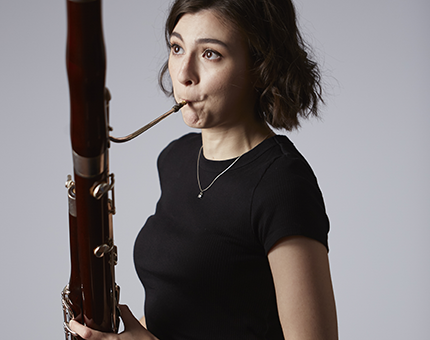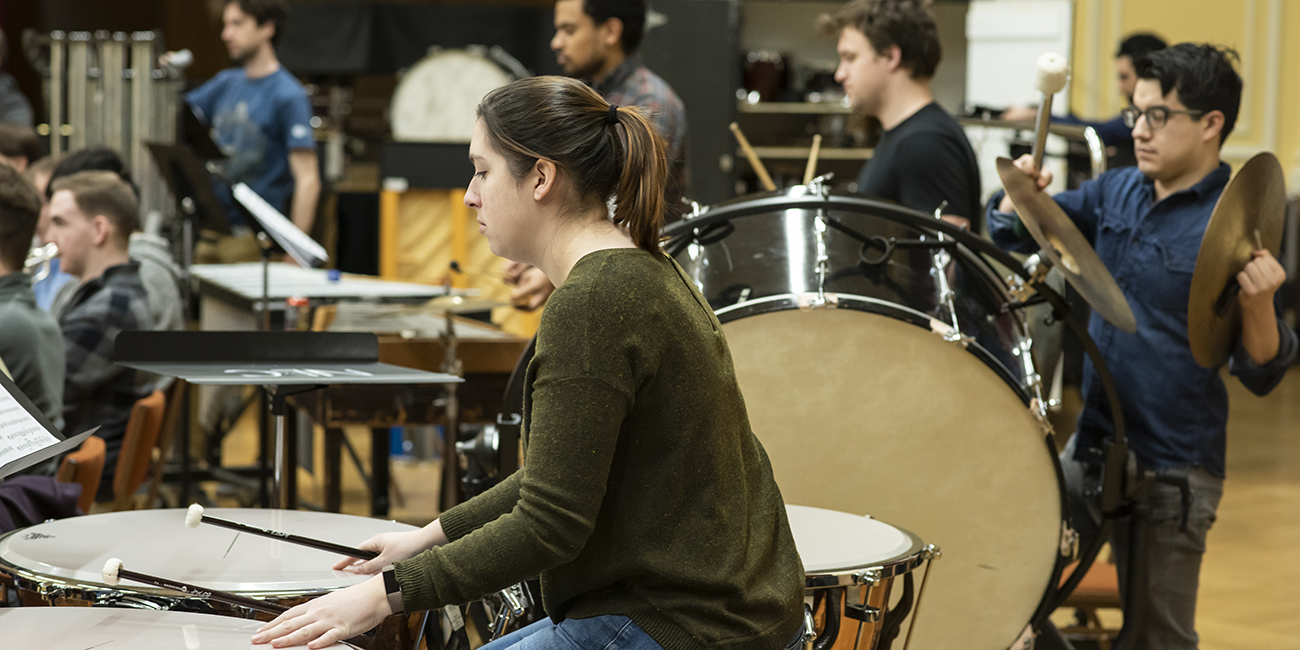Make a Bequest
A charitable gift from your estate is a favored method of giving that enables you to achieve your financial goals and benefit New England Conservatory. No other planned gift is as simple to make or as easy to change should you ever need the assets during your lifetime.
A bequest may be right for you if:
- You want to make a gift to New England Conservatory.
- You want the flexibility to change your mind.
- You want continued access to your wealth, should you need it.
- You are concerned about outliving your resources.
How Your Gift Helps
Your gifts to the New England Conservatory help us educate and train musicians of all ages from around the world, drawing on the talent and deep reservoir of experience of our distinguished faculty. Your support will provide the University with the resources to…
 |  |  |
| inculcate the highest standards of excellence while nurturing artistic sensibility and creative growth; | foster an environment that maximizes individual attention from teachers, allowing students to explore and develop their unique artistic personalities; | reinforce and expand the position of music in society by educating the next generation of musical performers and leaders. |
Remembering New England Conservatory in your will is a wonderful way for you to make a lasting gift. Large or small, your bequest will make an important contribution to our long-term strength and our ability to carry on with our activities.
But what if you don't have a will or living trust? You are not alone. Most Americans don’t have a will.
Without a will, the laws of your state will decide how your estate is divided. Typically, the probate court will divide your estate among your closest surviving family members according to a formula, and none of your estate can go to New England Conservatory or any other charity. If you wish to have a say in how your estate is distributed, you must have a will or living trust. We encourage you to work with an experienced attorney to create a will or living trust that accomplishes your goals for your estate.
Ways you can define a charitable gift in your estate plan
There are several ways that you can define the amount of your charitable gift to New England Conservatory. They are:
- A gift of a particular amount of money. For example, you give $25,000.
- A gift of a specific item or items. For example, you give 1,000 shares of ABC Corporation.
- A gift that will be made only if one or more conditions are met. For example, you give $25,000 provided we still offer a particular program or service and your spouse does not survive you.
- A gift that will be made from the remainder of your estate once all other bequests, debts, and taxes have been paid. For example, you give 25% of the remainder of your estate. Often called a "residuary bequest," this approach assures that your family will be taken care of before your estate makes a bequest to us.
Ways to specify how we may use your bequest
You have several options for telling New England Conservatory how we may use your bequest once we receive it. They are:
- An unrestricted bequest – This is a gift for our general purposes. This can be the most useful kind of gift because it allows us to put your gift to the best possible use at the time we receive it.
- A restricted bequest – This is a gift for a specific use, such as a special project or program that is important to you. It is best for you to consult with us before placing restrictions on your bequest to be sure we can carry out your wishes.
- An endowed bequest – This is a gift where our organization invests your donation along with the rest of our endowment. We distribute these funds in accordance with our endowment spending policy. This approach assures that your gift will continue to benefit us long after you're gone. An endowed bequest can be restricted or unrestricted.
- An honorary bequest – This is a gift made in honor of someone else. Any form of bequest can also be an honorary bequest. We would be pleased to recognize the people you wish to honor with your gift.
Make sure we can carry out your wishes
It is very important that your bequest be accurately and clearly described in your estate plan so that we can carry out your wishes as you intended. We are pleased to consult with you regarding the terms of your bequest to make sure that we will be able to carry out your intentions. In order to avoid any possible question that your bequest is to our organization, be sure to include our full legal name and our federal tax identification number in your bequest.
Legal name: New England Conservatory of Music
Current Address: 290 Huntington Ave, Boston, MA 02115
Tax identification number: 23-7225104
We are happy to provide you with sample bequest language to assist you and your attorney.
You have complete flexibility to change your bequest at any time. If circumstances change in a way that makes you want to revise your gift to us, you can.
Tax benefits
Because your bequest is revocable, you do not receive an income tax charitable deduction when you create it. Rather, your estate will receive an estate tax deduction for the full value of your bequest in the year it is made. Depending on a variety of factors, including the size of your estate and estate tax law at the time your estate is settled, this deduction may or may not save estate taxes.
Bequest alternatives
In addition to adding bequest language to your will, here are a few other simple ways for you to make a bequest to us:
- Make New England Conservatory a designated beneficiary of a life insurance policy.
- Make New England Conservatory a designated beneficiary of an IRA or other retirement plan.
- Make New England Conservatory a designated beneficiary of savings bonds.
- Instruct your bank to "pay on death" to New England Conservatory some or all of a specific bank account.
- Instruct your brokerage firm to "transfer on death" to New England Conservatory some or all of a specific brokerage or other financial account.
Please let us know if you have included New England Conservatory in your estate plans. We would welcome the opportunity to thank you for your thoughtful gift and to confirm that we can carry out your wishes.
Example
Fannie Stevenson, a widow, has been a supporter of New England Conservatory for many years. Fannie is in good health now, but does not want to be a financial burden to her children should she require expensive health care in the future.
New England Conservatory is one of two charities to which she has been most dedicated. She would like to make a lasting gift to each of them in memory of her husband. After discussing her options with her estate planning advisor, she decides to create a residuary bequest in her will for each of her two favorite charities. Each charity will receive 50% of the remainder of her estate after all other obligations, such as taxes and bequests to her children and grandchildren, have been taken care of.
Benefits
- Fannie’s assets will remain available to her should she need them.
- The revocable nature of her gift will minimize the possibility that she will ever need financial help from her children.
- If her estate is worth what she expects when it is settled, she will be able to provide generous legacy gifts to the two charities that have meant the most to her and her late husband.
Additional Giving Options
By making a planned gift, you can strengthen NEC and gain financial and tax benefits for you and your family. For more information, please contact Aaron McGarry, Planned Giving Officer, by email or by phone at 617-585-1356.
Real estate can be contributed as an outright gift or to finance a planned gift. Available options include a retained life estate, which allows the donor to continue to use the property for a certain number of years, or for the donor’s lifetime. Other arrangements offer special tax advantages and lifetime income.
Gifts of real estate include undeveloped land, a residence, a vacation home, a farm, or commercial property. NEC requires the donor to bear certain costs when making a real estate gift, such as an appraisal to determine the fair market value. Also, NEC deducts transaction costs from the proceeds of the sale of the property, including the closing costs, title insurance, a survey (if needed), and any taxes due before the gift is completed.
For any questions about gifts of real estate, please contact Abigail Smitka, Assistant Vice President of Major Gifts and Campaigns, at as3628@necmusic.edu or (617) 585-1719.
Many companies support the philanthropic interests of their employees by matching employee contributions to nonprofit organizations like NEC. If your employer offers a matching gift program, you may be able to double or even triple your gift!
For more information on matching gift contributions, please contact Cheryl Fries, Assistant Director of Advancement Operations, at cheryl.fries@necmusic.edu or (617) 585-1373.
Gifts of personal property, such as musical instruments, recordings, and scores provide valuable support for our music education programs. Through the support of in-kind gifts, you can help NEC meet the college’s ongoing need to expand its inventory — and you qualify for a tax deduction.
NEC accepts in-kind donations on a case-by-case basis. For more information, please contact Patricia Kopko, Director of Advancement Operations, by email or phone at 617-585-1225
Friends of NEC may elect to make gifts to commemorate a loved one’s life, birthday, anniversary, or other special occasion. We will gladly notify those you wish to know of any gifts made in their honor.
Contributions in any amount may be directed to The NEC Fund, or to the area of your choice. Please note the name of the person you wish to commemorate when you make your gift.
Contact Us
To learn more about how you can support NEC, please contact Cheryl Fries, Assistant Director of Advancement Operations, at cheryl.fries@necmusic.edu or (617) 585-1373.
New England Conservatory is a 501(c)3 non-profit organization. All donations are tax deductible to the full extent of the law. Our non-profit tax ID is 23-7225104.
Contact Us






